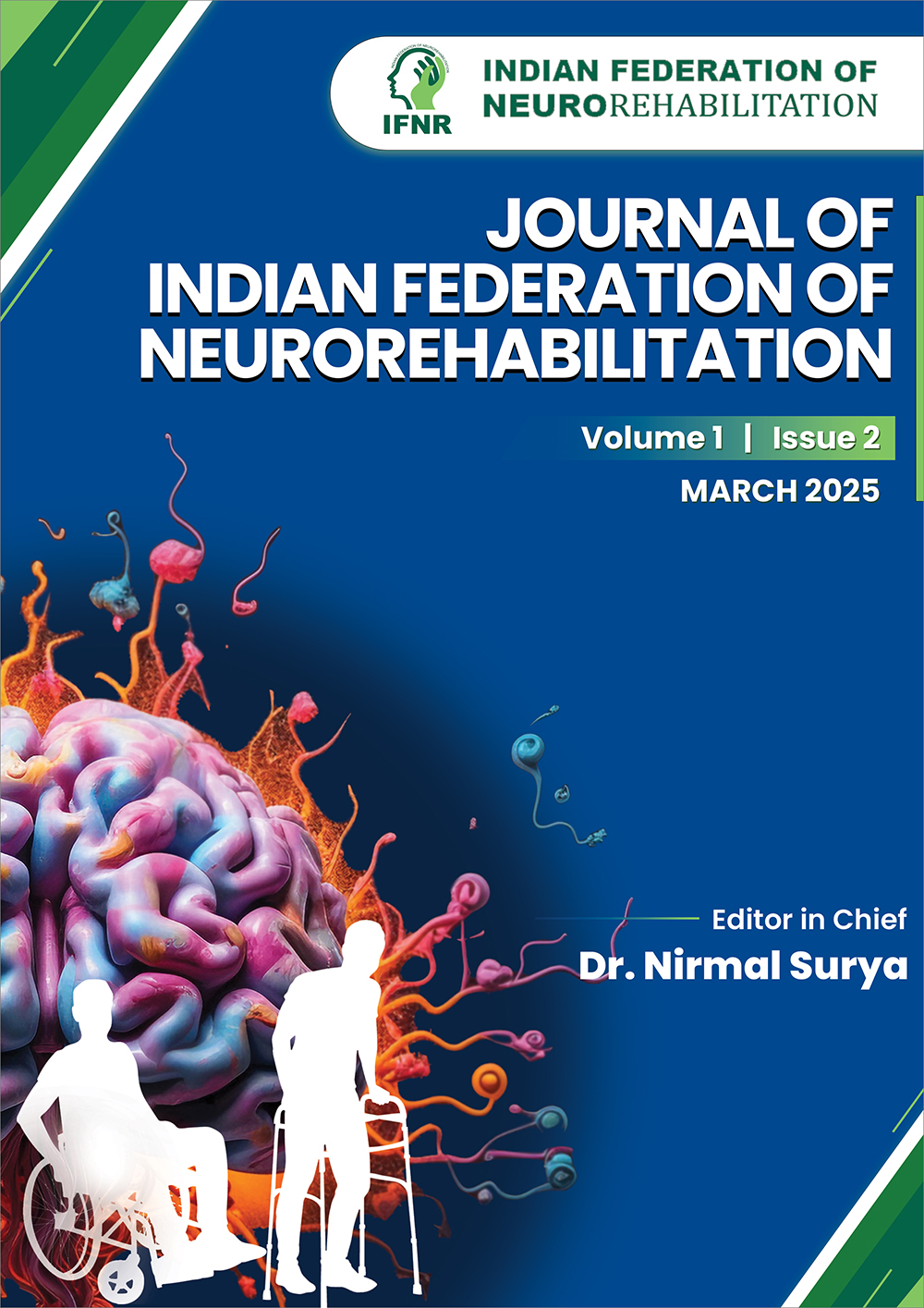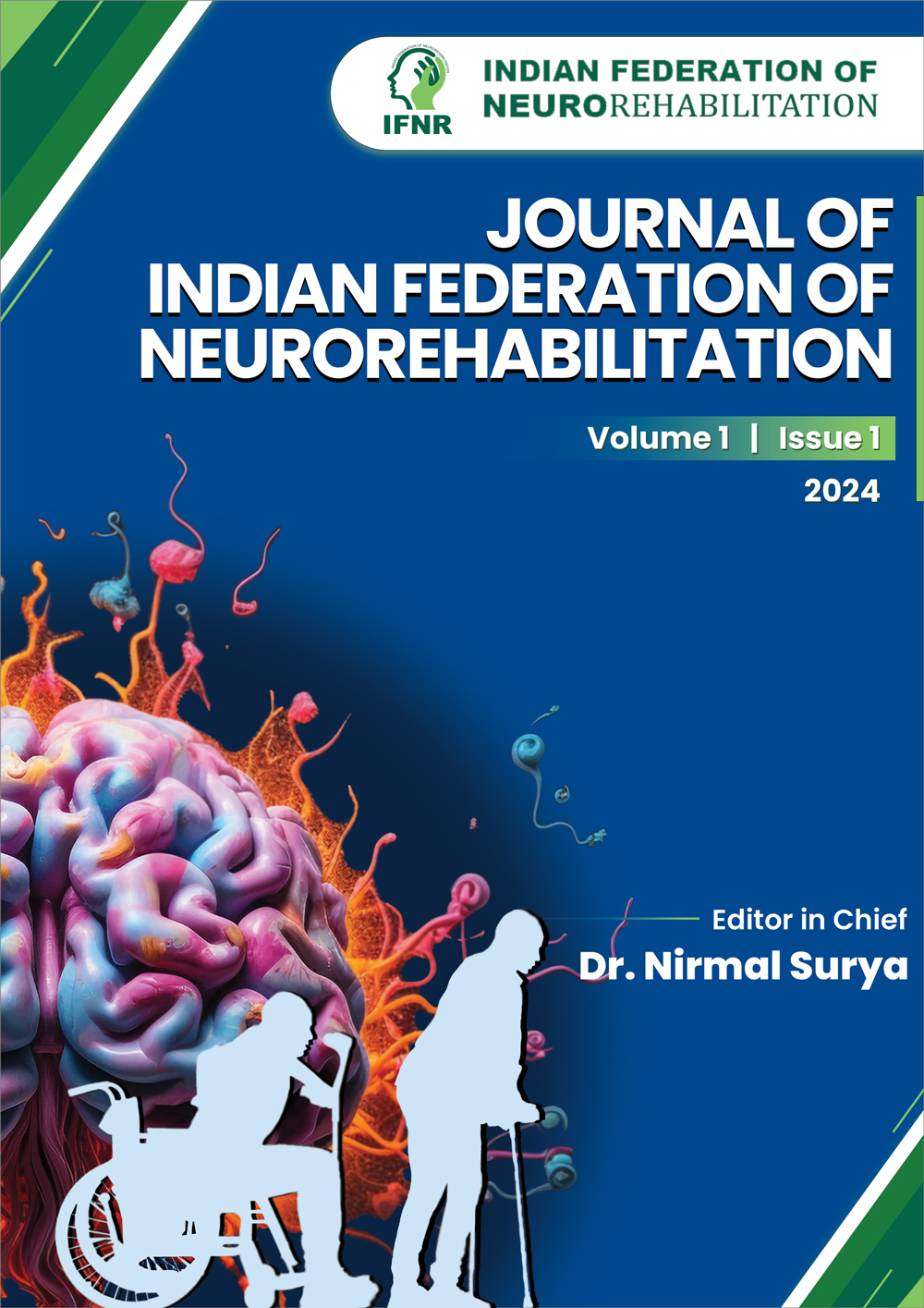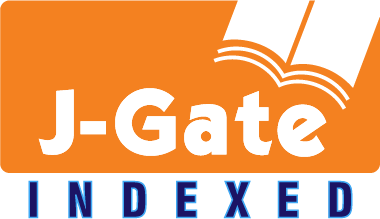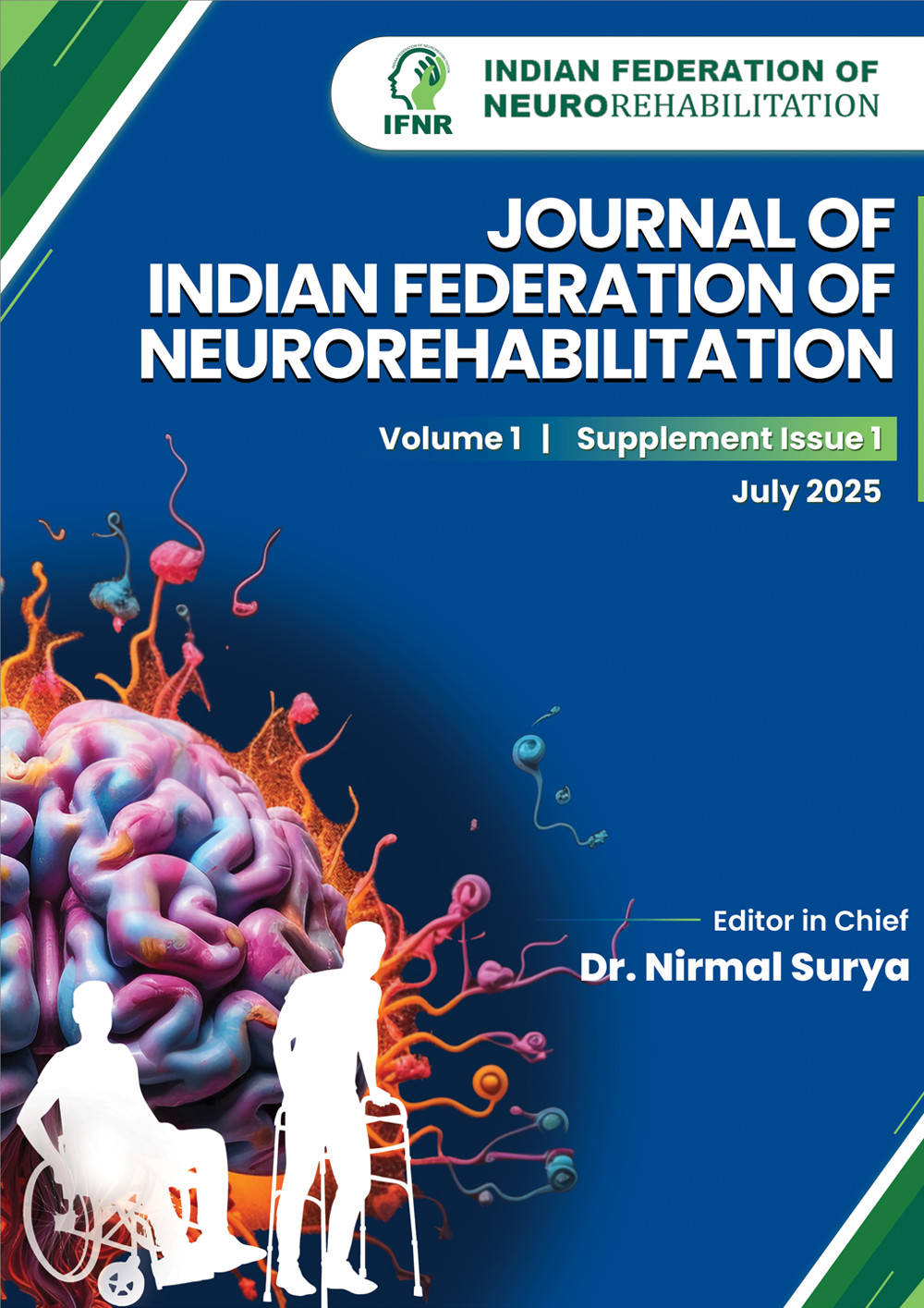Volume 1 | Issue 2 | 2025

Published since 2024 as an open access journal in online format at half yearly frequency in English.
ISSN Number: 3048-8680
Publisher:
Indian Federation of Neurorehabilitation
310, Lotus House, New Marine Lines, Mumbai 400020.
Email: ifnr2012@gmail.com
Editor-in-Chief
Dr Nirmal Surya
nsurya@ifnr.org
+91 98200 26889
About us click here
Contact us click here
| Sr. No. | Title | Read |
|---|---|---|
| 1 | Issue Front cover | View |
| 2 | Editorial Team |
View |
| 3 |
EDITORIALRobotic Rehabilitation in Stroke. Journal of Indian Federation of Neurorehabilitation. |
View |
| 4 |
Original ArticlesExploring Patient Engagement: A Service Evaluation on Use of Rehacom in Conjunction with Conventional Cognitive Rehabilitation in Acquired Brain Injury Patients at University Hospitals of Leicester Journal of Indian Federation of Neurorehabilitation. |
View |
| 5 |
Reliability And Validity of the Function In Sitting Test(FIST) for non ambulatory individuals with Subacute Spinal Cord Injury: A Pilot Study Journal of Indian Federation of Neurorehabilitation. |
View |
| 6 |
Yoga In Holistic Rehabilitation of the Ageing, Carer and Cared. Journal of Indian Federation of Neurorehabilitation. |
View |
| 7 |
Exploring Social Stigma and Body Image Perception Among Women with Epilepsy in India. Journal of Indian Federation of Neurorehabilitation. |
View |
| 8 |
Early-Career Neurorehabilitation Professionals in India: Challenges, Barriers, and the Road Ahead Journal of Indian Federation of Neurorehabilitation. |
View |
| 9 |
CASE REPORTSNavigating speech and language complexity: A case study of a child with multifaceted health conditions. Journal of Indian Federation of Neurorehabilitation. |
View |
| 10 |
From Critical Care to Community: A Case Report on Guillain-Barré Syndrome Rehabilitation. Journal of Indian Federation of Neurorehabilitation. |
View |
| 11 |
Navigating speech and language complexity: A case study of a child with multifaceted health conditions Journal of Indian Federation of Neurorehabilitation. |
View |
| 12 |
From Critical Care to Community: A Case Report on Guillain-Barré Syndrome Rehabilitation. Journal of Indian Federation of Neurorehabilitation. |
View |
| 13 |
COMMENTARYTransforming Healthcare Learning: The Role of Artificial Intelligence in Modern Education. Journal of Indian Federation of Neurorehabilitation. |
View |
| 14 | Issue Back Cover | View |
Volume 1 | Issue 1 | 2024

Published since 2024 as an open access journal in online format at half yearly frequency in English.
ISSN Number: 3048-8680
Publisher:
Indian Federation of Neurorehabilitation
310, Lotus House, New Marine Lines, Mumbai 400020.
Email: ifnr2012@gmail.com
Editor-in-Chief
Dr Nirmal Surya
nsurya@ifnr.org
+91 98200 26889
About us click here
Contact us click here
| Sr. No. | Title | Read |
|---|---|---|
| 1 | Issue Front cover | View |
| 2 | Editorial Team |
View |
| 3 |
EDITORIALAdvancing Neurorehabilitation in India: Embracing the Past, Transforming the Present, and Envisioning the Future. Journal of Indian Federation of Neurorehabilitation. |
View |
| 4 |
Original ArticlesProfile of dysphagia in acute stroke: a prospective observational study from a tertiary care centre in Mumbai, India. Journal of Indian Federation of Neurorehabilitation. |
View |
| 5 |
Hyperbaric Oxygen Therapy in Improving Neurological and Functional Outcome of Persons with Severe Hypoxic Ischemic Encephalopathy Journal of Indian Federation of Neurorehabilitation. |
View |
| 6 |
Health Systems for Rehabilitation – Critical Appraisal of the National Programme for Stroke in India. Journal of Indian Federation of Neurorehabilitation. |
View |
| 7 |
Tele assessment of Communicative effectiveness among persons with Parkinson’s disease. Journal of Indian Federation of Neurorehabilitation. |
View |
| 8 |
Behaviour of H-reflex amplitude in the individual with Spinal Cord Injury: An observation study. Journal of Indian Federation of Neurorehabilitation. |
View |
| 9 |
COMMENTARYUnveiling the Potential: Task-Based Bilateral Arm Training in Stroke Neurorehabilitation. Journal of Indian Federation of Neurorehabilitation. |
View |
| 10 | Issue Back Cover | View |
EDITOR IN CHIEF
Dr. Nirmal Surya
ASSOCIATE EDITOR
Dr. Abhishek Srivastava
Dr. Taral Nagda
Dr. Hitav Someshwar
Dr. Guhan Ramamurthy
ASSISTANT EDITOR
Dr. Arun Shivaraman
Dr. Sonal Chitnis
Dr. Murali Krishnan
Dr. Suvarna Ganvir
ADVISORY BOARD
Dr. Ashok Johari
Dr. BK Yamini
Dr. Deepak Palande
Dr. Lalith Satnukam
Dr. Mohammed Sakel
Dr. R K Dhamija
Dr. Urvashi Shah
Dr. Volker Hoemberg
EDITORIAL BOARD MEMBERS
National Members
Apoorva Puranik, Indore
AV Porsellvi, Chennai
Anupam Gupta, Bangalore
Dorcas Gandhi, Ludhiana
Gayatri Hattangdi, Mumbai
John Solomon, Manipal
Mansi Jagtap, Mumbai
Navin Kumar, Pondicherry
Navita Purohit, Mumbai
Preethi Shetty, Manipal
Prassana Hegde, Bangalore
Poornima Gauri, Pune
Shiv Lal Yadav, Delhi
Shantala Hegde, Bangalore
Vidya Shenoy, Mumbai
International Members
Caterina Pistarini, Italy
Daffin Muresanu, Romania
Fary Khan, Australia
Humberto Bazo, Italy
Intan Sabrina, Indonesia
Leonardi Matilde, Italy
Marta Imamura, Brazil
Mayowa Owolabi, Nigeria
Michael Thaut, Canada
Nam Jong Paik, South Korea
Sabhat Wasti, UAE
Suresh Kumar, UK
Siva Nair, UK
Thomas Platz, Germany
Wayne Feng, USA
Aim and Scope of the Journal of Indian Federation of Neurorehabilitation (JIFNR)
Aim:
The Journal of Indian Federation of Neurorehabilitation (JIFNR) aims to serve as a premier platform for disseminating high-quality research and knowledge in the field of neurorehabilitation, focusing on improving clinical practice, research, education, and policy development in neurorehabilitation in India and globally. The journal aspires to bring together professionals from multidisciplinary backgrounds to share cutting-edge research, innovations, and case studies that address the challenges faced in neurorehabilitation. It encourages the integration of evidence-based practices and advocates for enhancing patient outcomes through novel therapeutic strategies, interdisciplinary collaboration, and community-based rehabilitation programs.
JIFNR also aims to highlight the unique challenges and advancements in neurorehabilitation within the Indian context, fostering collaborations between national and international stakeholders, researchers, and clinicians. By promoting a knowledge exchange network, the journal seeks to bridge the gap between scientific research and clinical applications, thereby advancing the field and improving the quality of life of individuals with neurological disorders.
Scope:
- Interdisciplinary Focus:
JIFNR encompasses a wide range of disciplines within neurorehabilitation, including but not limited to neurology, physiotherapy, occupational therapy, speech and language therapy, psychology, and rehabilitation nursing. The journal promotes interdisciplinary approaches to care, recognizing the importance of a holistic, patient-centered strategy in neurorehabilitation. This interdisciplinary focus encourages submissions that combine insights from various fields, demonstrating the effectiveness of collaborative approaches in improving patient outcomes.
- Clinical and Experimental Research:
The journal publishes original research articles, clinical trials, and experimental studies that contribute to the advancement of neurorehabilitation practices. These can include studies on neuroplasticity, motor learning, sensory rehabilitation, cognitive rehabilitation, and novel therapeutic interventions for conditions such as stroke, traumatic brain injury, spinal cord injury, cerebral palsy, multiple sclerosis, and neurodegenerative diseases.
- Innovative Therapies and Technologies:
JIFNR seeks to highlight innovations in rehabilitation technologies, including robotics, virtual reality, brain-computer interfaces, and tele-rehabilitation. It encourages submissions that explore the application of emerging technologies in neurorehabilitation and their impact on patient outcomes. The journal also emphasizes the importance of low-cost and accessible technologies that can be applied in resource-limited settings, particularly in developing countries like India.
- Case Studies and Clinical Practice Guidelines:
The journal welcomes case reports and studies that illustrate unique clinical scenarios, best practices, and challenges in neurorehabilitation. These case studies provide valuable insights into patient care and help establish clinical practice guidelines that can be used by healthcare professionals in a variety of settings, from specialized rehabilitation centers to rural healthcare systems.
- Public Health and Policy Research:
In recognition of the growing need for neurorehabilitation services in public health, JIFNR includes articles that address policy development, healthcare access, and strategies for implementing neurorehabilitation programs on a larger scale. This includes studies on the integration of neurorehabilitation into primary healthcare, the development of community-based rehabilitation programs, and the use of the hub-and-spoke model to improve access to neurorehabilitation in remote and rural areas.
- Educational Initiatives and Professional Development:
JIFNR aims to promote education and training in neurorehabilitation by publishing articles on curriculum development, fellowship programs, and continuing education for rehabilitation professionals. The journal also serves as a platform for sharing experiences and strategies in improving education for neurorehabilitation professionals, thereby contributing to capacity building and enhancing the quality of care.
- Evidence-Based Practice and Outcome Measures:
The journal strongly emphasizes the importance of evidence-based practice in neurorehabilitation. It encourages the submission of studies that evaluate the effectiveness of various rehabilitation interventions using robust outcome measures. This includes both quantitative and qualitative research that helps establish a solid evidence base for clinical decision-making.
- Global and Regional Perspectives:
While the journal has a strong focus on neurorehabilitation in the Indian context, it also seeks to provide a global perspective by including studies and reviews from international contributors. By fostering a global exchange of knowledge, JIFNR helps its readers understand how advancements in neurorehabilitation are being implemented worldwide and how these strategies can be adapted to the Indian healthcare system.
- Community and Family-Centered Rehabilitation:
Recognizing the role of family and community in neurorehabilitation, JIFNR supports research that investigates family-centered and community-based approaches to care. This includes strategies for engaging families in the rehabilitation process, the role of caregivers, and the development of community resources to support long-term rehabilitation efforts.
- Ethics and Social Responsibility:
Articles addressing ethical concerns, social responsibility, and equity in neurorehabilitation are of significant interest to the journal. This includes topics like access to care for marginalized populations, gender disparities in rehabilitation services, and ethical considerations in the use of advanced technologies in patient care.
Conclusion::
The Journal of Indian Federation of Neurorehabilitation aims to be at the forefront of promoting innovation, evidence-based practice, and interdisciplinary collaboration in the field of neurorehabilitation. By providing a platform for research dissemination and professional development, JIFNR seeks to improve the quality of care for individuals with neurological conditions, both in India and globally. Through its comprehensive scope, the journal aspires to bridge the gap between research and practice, ensuring that scientific advancements translate into real-world benefits for patients and healthcare systems.
Journal of Indian Federation of Neurorehabilitation (JIFNR) - Author Guidelines
Submission Guidelines
Email for Submissions:
All manuscripts should be submitted to: journal@ifnr.org with cc to ifnr2012@gmail.com
Types of Articles
- Original Research Articles: Full-length papers presenting novel findings.
- Review Articles: Comprehensive overviews of specific topics.
- Case Reports: Detailed presentations of single or multiple cases.
- Clinical Trials: Reports on clinical trial outcomes
- Letters to the Editor: Brief, relevant, and impactful communications.
Manuscript Preparation
1. General Requirements:
- Manuscripts must be written in English.
- Use Times New Roman, font size 12, double-spaced throughout.
- Include page numbers in the bottom right corner.
2. Title Page:
- Title of the manuscript.
- Full names, affiliations, and email addresses of all authors.
- Corresponding author’s contact information.
3. Abstract:
- A concise summary of the study (250 words maximum)./li>
- Should include Background, Methods, Results, and Conclusion.
- Keywords (up to 5).
4. Main Text:
- Introduction: Brief background, objectives, and aims of the study
- Methods: Detailed description of the methodology used.
- Results: Clear and concise presentation of findings.
- Discussion: Interpretation and implications of results, limitations, and future directions.
- Conclusion: Summary of key findings and their significance.
5. References:
- Follow the Vancouver referencing style
- Ensure all references are cited in the text and listed at the end
6. Figures and Tables:
- Include as separate files.
- Numbered consecutively and referred to in the text.
- Provide captions for all figures and tables.
Ethical Considerations
- Ensure compliance with ethical standards for research involving human participants
- Include a statement on ethical approval and consent in the manuscript.
Conflict of Interest
Disclose any potential conflicts of interest.
Review Process
Manuscripts will be peer-reviewed by experts in the field. Authors will receive feedback and may be required to revise their manuscripts.
Copyright
Authors must agree to transfer copyright to JIFNR upon acceptance of their manuscript.
Contact Information
For any queries, please contact the editorial office at: ifnr2012@gmail.com
Journal of Indian Federation of Neurorehabilitation (JIFNR) - Reviewer Guidelines
Role of Reviewers
Reviewers play a critical role in maintaining the quality and integrity of the Journal of Indian Federation of Neurorehabilitation (JIFNR). As a reviewer, you are responsible for evaluating the quality, relevance, and accuracy of submitted manuscripts. Your feedback will help authors improve their work and assist the editorial team in making publication decisions.
Confidentiality
- Manuscripts under review should be treated as confidential documents.
- Do not share or discuss the manuscript with anyone outside the review process without the permission of the editorial office.
Review Criteria
When reviewing a manuscript, please consider the following criteria:
Originality and Relevance:
- Does the manuscript present novel findings or insights?
- Is the topic relevant to the field of neurorehabilitation?
Methodology:
- Are the research methods appropriate and well-described
- Is the study design robust and suitable for the research question?
Data and Results:
- Are the data presented clearly and logically?
- Are the results valid and reliable?
Interpretation and Discussion:
- Are the interpretations and conclusions supported by the data?
- Does the discussion adequately address the implications, limitations, and future directions of the study?
Clarity and Presentation:
- Is the manuscript well-organized and clearly written?
- Are tables, figures, and references appropriate and correctly formatted?
Ethical Considerations
- Ensure that the manuscript adheres to ethical standards for research involving human participants.
- Report any potential ethical concerns, such as plagiarism or data fabrication, to the editorial office.
Review Process
1. Initial Assessment:
- Read the manuscript thoroughly
- Consider the overall quality, significance, and contribution to the field.
2. Detailed Comments:
- Provide constructive and detailed feedback for each section of the manuscript.
- Highlight strengths and identify areas for improvement.
3. Recommendation:
- Based on your evaluation, make a recommendation to the editorial team:
- Accept
- Minor revisions
- Major revisions
- Reject
3. Confidential Comments to the Editor:
- Include any additional comments or concerns that you wish to communicate directly to the editorial team.
Timeliness
- Complete your review within the timeframe specified by the editorial office.
- If you are unable to review the manuscript or need more time, please inform the editorial office promptly
Conflict of Interest
Disclose any potential conflicts of interest that might bias your review.
Contact Information
For any queries or concerns, please contact the editorial office at: journal@ifnr.org
Journal of Indian Federation of Neurorehabilitation (JIFNR) - Standard Operating Procedure (SOP)
Roles and Responsibilities
Editor-in-Chief:
- Provide overall leadership and direction for the journal.
- Make final decisions on manuscript acceptance.
- Ensure the journal’s content meets high standards of quality and integrity.
- Oversee the peer-review process.
- Represent the journal at conferences and meetings.
Associate Editors:
- Assist the Editor-in-Chief in managing the review process.
- Assign manuscripts to reviewers.
- Make recommendations on manuscript decisions based on reviewers' comments
- Ensure timely processing of manuscripts
Assistant Editors:
- Handle initial manuscript screening for adherence to submission guidelines.
- Communicate with authors regarding manuscript status.
- Assist with the administrative tasks related to manuscript processing
- Support Associate Editors in managing the review process.
Editorial Board Members
- Provide expertise and advice on the journal’s content and direction.
- Review manuscripts within their area of expertise.
- Contribute to the development of editorial policies and strategies
- Promote the journal within their professional networks.
Flow Chart of the Manuscript Submission to Publication Process
Below is a flow chart depicting the steps involved from the submission of an article to its publication.
1. Submission:
- Author submits the manuscript via email to journal@ifnr.org
2. Initial Screening:
- Assistant Editor checks the manuscript for adherence to submission guidelines.
- Manuscript is assigned an identification number.
3. Assignment to Associate Editor:
- Editor-in-Chief assigns the manuscript to an appropriate Associate Editor.
4. Reviewer Assignment:
- Associate Editor selects and invites reviewers based on their expertise..
- Reviewers accept or decline the invitation.
5. Peer Review:
- Reviewers evaluate the manuscript and submit their reports.
- Reviews are typically completed within 4-6 weeks.
6. Decision Making:
- Associate Editor reviews the feedback and makes a recommendation to the Editor-inChief
- Editor-in-Chief makes the final decision (accept, minor revisions, major revisions, orreject).
7. Author Notification:
- Assistant Editor communicates the decision to the author.
- If revisions are required, the author revises the manuscript and resubmits.
8. Re-Review (if applicable):
- Revised manuscript may be sent back to the original reviewers for re-evaluation
9. Final Decision:
- Editor-in-Chief makes the final acceptance decision after any necessary revisions.
10. Copyediting:
- Accepted manuscript undergoes copyediting for grammar, formatting, and adherence to style guidelines.
11. Proofreading
- Author reviews and approves final proofs.
12. Publication:
- The final version of the manuscript is published online and in print (if applicable)



















